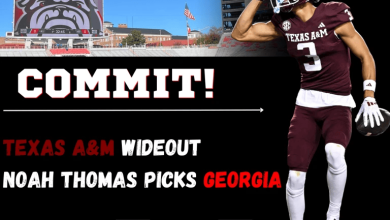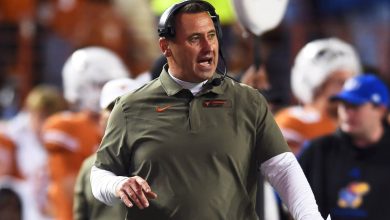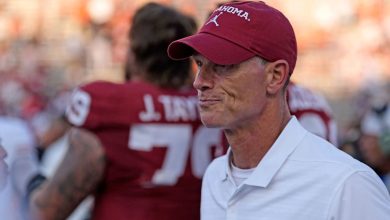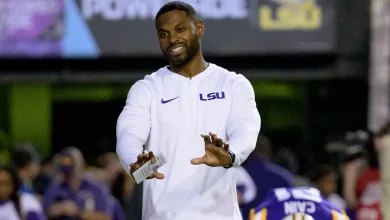Just as Kirby Smart was in Nick Saban’s Crimson Tide, Ryan Grubb is a perfect match with Kalen DeBoer’s Alabama football team.
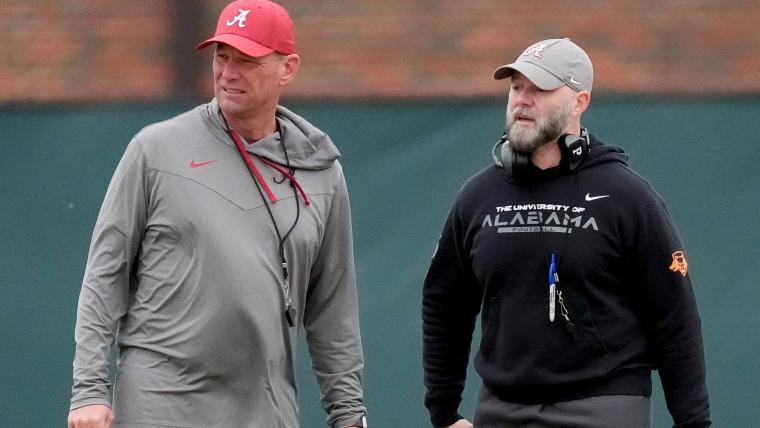
The evolution of college football is constantly reshaped by the best minds in the game—those coaches who not only excel in their ability to develop young talent but also understand the game’s strategic intricacies and how to push their programs to the next level. Nick Saban, often regarded as the greatest college football coach of all time, built an empire at Alabama through his disciplined, relentless approach. Kirby Smart, a former Alabama assistant under Saban, was one of the most important pieces of the Tide’s defensive juggernaut and has since carried those principles to a national championship-winning program at Georgia.
Similarly, in the modern era, Kalen DeBoer has been quietly revolutionizing offenses across college football with his innovative, up-tempo schemes that emphasize passing and exploiting mismatches. But what makes DeBoer’s approach even more effective is the presence of Ryan Grubb, his newly appointed offensive coordinator at Alabama—a coach who, just like Kirby Smart was to Saban’s defense, is an ideal partner to help implement and amplify DeBoer’s offensive vision.
As DeBoer seeks to build a high-powered offense at Alabama, Grubb is the perfect complement to help push the boundaries of Alabama football’s tradition of success. This pairing of DeBoer and Grubb creates an offense that is not only potent but adaptable to the high standards expected of a program that demands nothing less than excellence. Much like Smart’s time under Saban, Grubb will help steer Alabama toward national title contention, crafting an offense that both reflects and innovates upon the program’s history.
Kalen DeBoer’s Philosophy: A New Era for Alabama Football
To understand why Ryan Grubb and Kalen DeBoer are such a perfect match, it is essential to first grasp DeBoer’s offensive philosophy, which is rapidly transforming the way offenses function in college football. DeBoer, known for his highly successful stints at Indiana and Washington, has built an offensive system that emphasizes speed, efficiency, and creativity. At its core, DeBoer’s offense is designed to exploit the defense’s weaknesses by spacing out defenders and creating mismatches. His offense thrives on timing, precision, and the ability to read defenses quickly.
A key aspect of DeBoer’s success is his ability to build an offense that can adjust to different types of defenses. Whether it’s a fast-paced aerial attack or a more methodical, controlled ground game, DeBoer’s offense offers flexibility while maintaining a balance between power football and modern passing schemes. His work with quarterbacks like Michael Penix Jr. at Washington, where they revolutionized the Huskies’ passing game, has been exemplary.
At Alabama, where there has traditionally been an emphasis on power football, DeBoer will have the opportunity to modernize and diversify the offense, expanding the playbook to allow for more dynamic air raids and explosive big-play opportunities. For Alabama to achieve that balance between tradition and innovation, it needed a coordinator who could successfully execute DeBoer’s high-flying offensive approach, and Ryan Grubb was the ideal choice.
Ryan Grubb’s Credentials: A Natural Fit for DeBoer’s System
Ryan Grubb is a highly respected offensive coordinator whose name has become synonymous with dynamic, explosive offensive football. Prior to his arrival at Alabama, Grubb was integral to DeBoer’s success at Washington. As the offensive coordinator for the Huskies, Grubb helped shape one of the most high-powered offenses in college football, led by quarterback Michael Penix Jr., who put up record-breaking numbers. Grubb’s influence was pivotal in turning Washington’s offense into a well-oiled machine capable of putting up points against even the toughest defenses.
What makes Grubb an ideal fit for Alabama, under the leadership of DeBoer, is his deep understanding of how to blend traditional elements of offensive football with modern strategies. While at Washington, Grubb was responsible for orchestrating a fast-paced offense that utilized spread principles but still maintained a strong commitment to the run game when needed. This balance of establishing the run and then capitalizing on the passing game through well-timed and explosive plays is exactly what Alabama needs to take its offense into the future.
Grubb’s experience with quarterbacks like Penix, along with his ability to develop playmakers, makes him an ideal partner for DeBoer. Jalen Milroe, Alabama’s projected starting quarterback for 2025, is an immensely talented player who excels both as a passer and as a dual-threat with his legs. Under the tutelage of Grubb, Milroe can refine his skills in a system that will not only maximize his strengths but also provide him with more opportunities to make plays with his arm and his legs.
Additionally, Grubb’s understanding of how to use a diverse set of offensive personnel is a crucial asset. At Washington, he often utilized tight ends and running backs as integral pieces of the passing game—something that will be key for Alabama’s offense, where its running backs, such as Jase McClellan, and tight ends have often been undervalued as receiving threats. With Grubb’s guidance, Alabama’s offense will likely see more diversity in play-calling, where backs and tight ends are put in situations to make big plays, adding more unpredictability to the attack.
The Similarities Between Grubb and Saban’s Historical Relationships
If there’s one key parallel to draw between the partnership of Kalen DeBoer and Ryan Grubb and that of Nick Saban and Kirby Smart, it’s that both DeBoer and Grubb understand the value of marrying tradition with modern innovation. Just as Kirby Smart became the perfect complement to Nick Saban’s defense, Grubb is the ideal counterpart to DeBoer’s offense.
Kirby Smart, during his time as defensive coordinator at Alabama, was instrumental in turning the Tide into a defensive juggernaut. Smart’s defensive prowess and attention to detail helped cement Alabama’s reputation as the standard-bearer for defensive excellence in college football. Despite Smart’s own success at Alabama, he understood the importance of learning from Saban’s approach—how to continually adapt and innovate while adhering to the program’s longstanding values of discipline, toughness, and precision.
Similarly, Ryan Grubb is bringing his own set of skills to the Alabama offensive system, with a keen ability to adapt DeBoer’s passing-focused strategy to fit Alabama’s already established culture. While DeBoer brings the ideas and big-picture vision of an up-tempo, passing-heavy attack, it is Grubb who will refine that vision, implementing the practical elements of the offense while still embracing the program’s rich history of running the football and winning in the trenches. Grubb’s ability to balance these elements mirrors the success Smart found at Alabama, where he took Saban’s high standards and shaped them into a historically dominant defense.
For Alabama’s offensive line, which has long been a staple of the team’s success, Grubb’s offensive schemes will prioritize maintaining that physicality while utilizing more movement and misdirection. Just as Smart crafted a defense that could stop high-powered offenses, Grubb’s approach will be about creating mismatches through both physical and strategic design, not just relying on brute force.
Grubb’s Influence on Alabama’s Offensive Talent
With Grubb at the helm, Alabama’s offensive players can expect an environment that encourages both growth and flexibility. Quarterbacks, wide receivers, and running backs will all be asked to contribute in more diverse roles, leveraging their strengths to create a more explosive, unpredictable offense. Under Grubb’s tutelage, Alabama will become a team that is able to hurt opponents both with deep, vertical throws and with quick passes to the perimeter that utilize the speed and athleticism of playmakers.
The addition of Germie Bernard, a transfer from Washington, is a perfect example of how Grubb’s system emphasizes versatility. Bernard, who worked with Grubb at Washington, has the opportunity to thrive in an offense that is designed to showcase his skills as both a wide receiver and a runner. Players like Bernard will find themselves in an offense that not only allows them to do what they do best but also challenges them to expand their role and increase their impact on the game.
Running backs like McClellan will also benefit from Grubb’s system, which features running backs in the passing game as legitimate threats. McClellan is a powerful runner who also has the skill set to catch passes out of the backfield. Under Grubb, he will be able to refine these skills, creating a dynamic duo with Milroe that will be difficult for opposing defenses to stop.
A Vision for Alabama’s Future: Titles and Innovation
For Alabama football, the future has never looked more exciting. Under Kalen DeBoer’s leadership and Ryan Grubb’s offensive brilliance, the Crimson Tide’s offense is primed to become one of the most potent units in the country. Alabama has always been a powerhouse in college football, and now, with DeBoer and Grubb leading the way on offense, the program is positioned to innovate while still upholding the standards that have made Alabama football synonymous with excellence.
The Alabama faithful can rest assured that their team is not just keeping up with the modern evolution of college football but is setting itself up to lead the charge. With DeBoer’s offensive mind and Grubb’s ability to implement and refine those ideas, Alabama’s offense will continue to be a force to reckon with in the SEC and on the national stage.
Just as Kirby Smart was instrumental in Alabama’s defensive dominance, Ryan Grubb will play a crucial role in ensuring that the offensive side of the ball lives up to the “Bama standard.” Together, DeBoer and Grubb represent the next evolution of Alabama football—a team that will balance tradition with innovation and continue to pursue championships for years to come.



